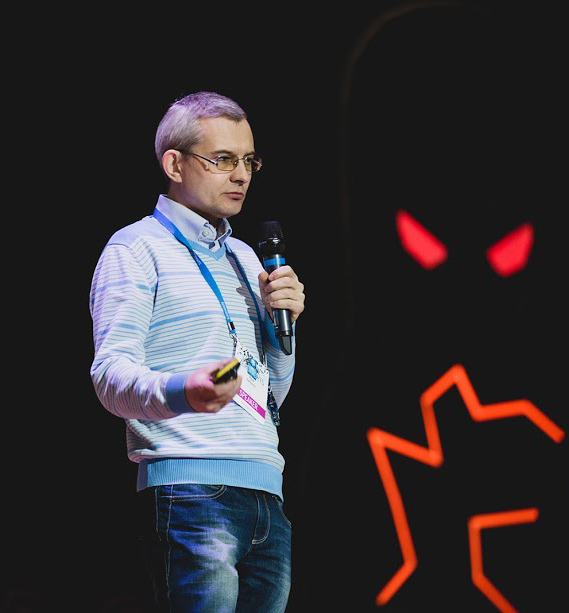How do IT professionals work? Ilya Safonov, Senior Research Scientist at Schlumberger

We continue to question specialists about work and leisure hours, professional habits, the tools they use, and much more.
It will be interesting to find out what unites them, in which they contradict each other. Perhaps their answers will help to identify some general patterns, useful tips that will help many of us.
Today our guest is Ilya Safonov, Senior Research Scientist, Schlumberger Moscow Research Center (Schlumberger). We talked to him at the ZeroNights'16 conference , where he represented Intel. But Ilya pays no less attention to communication with himself. This is one of the important life hacks that allow him to work more efficiently.
What do you do in the company?
Image processing, machine learning. At the previous place of work at Intel, he was still engaged in formal verification and testing methods.
One phrase (phrase) that best describes how you work:
Dig until you dig up your disruptive research (smiles).
How many hours a day do you devote to work?
I have three children, so it’s not always possible to devote too much time to work. Previously, it worked for 10-12 hours, now it’s less.
How many hours do you sleep?
An average of 7 hours.
Are you having breakfast
Yes, most often milk porridge or scrambled eggs.
How long does it take to get to the office?
From half an hour to 50 minutes. It all depends on traffic jams. I usually travel by car, sometimes by public transport. In time, it turns out approximately the same.
How do you spend time on the road?
I listen to the radio.
Which todo manager do you personally use?
I use Outlook and a paper notebook.
What issue-tracker / repository do you use?
Different groups use different tools. Personally, I prefer git.
What tools, frameworks do you use for development?
Since this is a scientific organization, we use a lot of scientific and mathematical software Matlab, Maple, and so on. Now a lot of modeling is done in Python. Some projects are in C ++ and C #. In general, a lot of things. And, of course, office applications are used for presentations, reports and articles.
Does your department have any internal projects, libraries, and why were they created?
Our division is focused on internal projects. One of the tasks is to give the results of research in production.
What annoys you the most when you work?
When you can’t agree with colleagues. There is a misunderstanding due to different views on certain issues, and this leads to delays in projects, dissatisfaction with each other. In my youth, I firmly defended my position. Now I'm trying to find a compromise: it turns out more efficiently.
What kind of professional literature would you recommend?
For image processing, I recommend Digital Imaging, R. Gonzalez, R. Woods. Now you can still buy the third edition in Russian.
What do you prefer: electronic readers or paper books?
Houses are paper. In public transport - electronic.
What equipment (computers, tablets, smartphones) and operating systems do you prefer at work and at home?
One of my previous jobs was Nokia. Therefore, in my family I still have Nokia phones and smartphones. Although some have already crashed, the replacement for Android smartphones is smoothly underway. Personally, I don’t use a tablet; my wife prefers an iPad.
If we talk about computers, then at home and at work these are laptops with Windows. Sometimes I go to a server with Linux.
Do you listen to music when you work?
I used to listen, but now I don’t.
Which life hack allows you to be more effective?
We must interrupt, walk. If something doesn’t work out for me, I will go for a walk. In this case, I can talk to myself. About 20 years ago, passers-by turned around, now everyone is used to using headsets for phones, they think that I’m talking on a cell phone (smiling).
What applications and services can you do without in work or in your personal life?
Email and instant messenger.
What would Ilya Safonov write in a letter to the future to himself?
To not give up. If something doesn’t work out, we must continue. You can’t quit.
You have come a long way. And someone is now at the beginning of this path. What would you recommend to a person trying to go the same way?
Think more, develop a critical outlook on things. Now many young people rely too much on the Internet. Of course, many individual facts and examples can be found on the Internet, but this does not eliminate the need to constantly and systematically learn, systematize knowledge and look for causal relationships.
